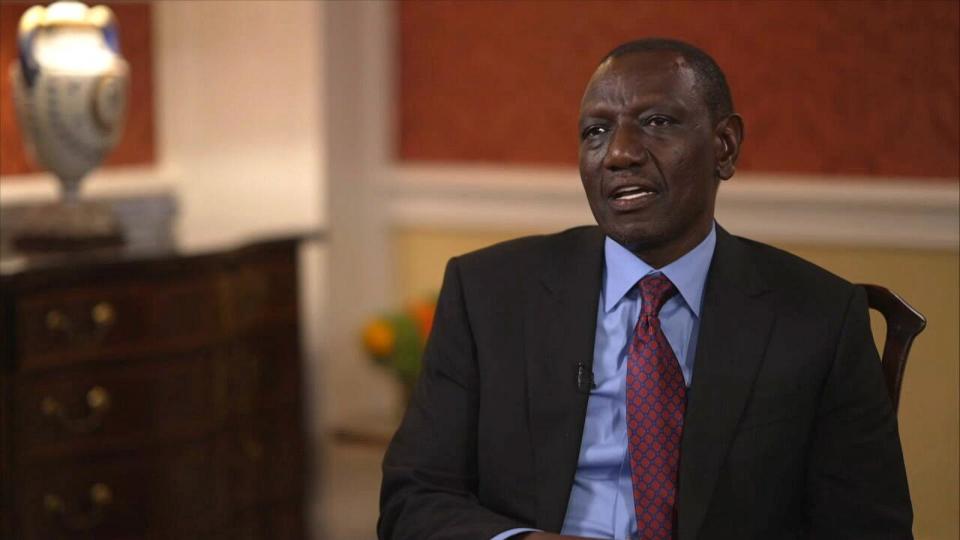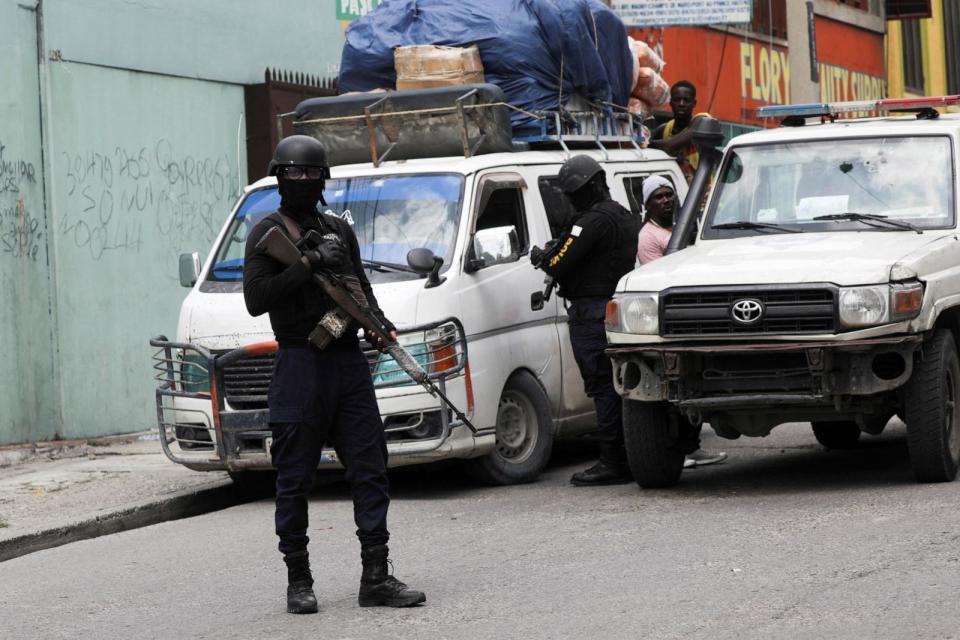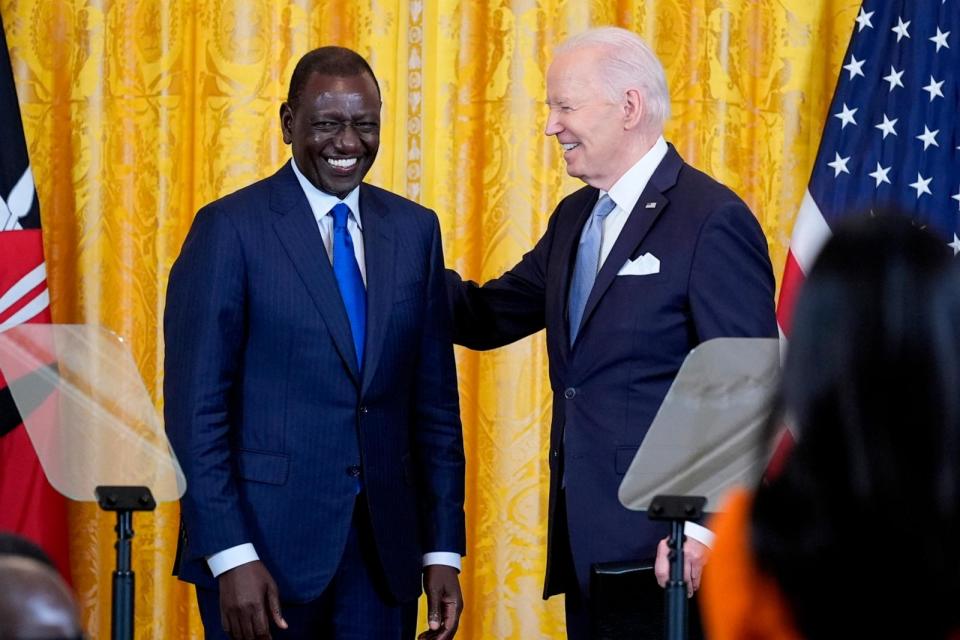Kenyan President William Ruto discusses US visit, supporting Haiti
Kenyan President William Ruto came into the spotlight this week as he became the first African leader to receive a state visit at the White House this week.
President Joe Biden praised the country for leading the effort to quell gang violence in Haiti. On the night of their state dinner, a group of missionaries – including Americans – were killed by gangs in Haiti.
MORE: Missouri state representative says daughter, son-in-law killed in Haiti: 'My heart is broken'
Ruto has pledged to send more troops to Haiti to deal with the rising gang violence, despite criticism that the move is done at the behest of U.S. interests.
ABC News's Senior White House correspondent Selina Wang sat down with Ruto to discuss Kenya's international policies and his visit with Biden.

SELINA WANG: President Ruto, thank you so much for being here. So what does it mean to be the first African leader in more than 15 years to receive a state visit?
PRESIDENT WILLIAM RUTO: What it means the situation is changing. We have embarked on an aggressive narrative-changing engagement because Africa for a long time has been viewed profiled as a continent of trouble, war, poverty, disease and all the negative things. But what we are saying this time around ... and I started this campaign last year during the Africa climate summit that yes, we could be having our own share of troubles and problems. But Africa to me is a continent of great potential, with tremendous potential and opportunity. So this is what we are working on. And I'm very proud that President Biden invited me for this, to undertake this state visit. It's not just about Kenya, it's about our continent as well. And many people who want to build relationships that are meaningful, that give us a chance for a win-win outcome.
MORE: Video Biden, Kenyan President William Ruto hold joint press conference
WANG: In 2022, President Biden had promised to visit the African continent sometime within a year. That obviously did not happen, did the president tell you why he never made the trip?
RUTO: Well, it's certainly my place to ask him, but two things have happened. We have the African Leadership Summit here. Where we engage with President Biden. And I think there was substantial, you know, agreements on what the future would look like, especially on matters of security on matters of economy, and on shared issues that are of importance to America and to Africa. And then secondly, there is this visit that I have undertaken, and if you look at the issues that we have arrived at as an outcome of the conversation between me and President Biden, they are issues that are Pan-African. Let me give you examples: number one, America has agreed to work with us on redesigning the international financial architecture. America has agreed that the current architecture is not fair. And therefore we need to think about how to re-engineer it. That's number one.
Number two, they have also committed substantial resources, including doubling their resources to either the World Bank's conditional windows. That means 26 African countries, will now have a chance to access concessional resources to manage two important things to mind to manage climate action. Because we are suffering the effects of climate change, and number two to manage their debt. And then number three, we have also agreed on expanding opportunities for training. Opportunities for value addition, agro-processing, in fact, the Africa green industrialization initiative that we launched last year at COP 28. We have agreed today that is going to be a joint program. In fact, there was a Nairobi Washington statement that speaks to Pan-African issues, including what we can do together in the areas of security, what we can do together in the areas of finance and the economy and the economy, and creating jobs and creating opportunities. I think we have managed to achieve so much, even before President Biden comes to our continent.
WANG: And on the matter of security, Kenya is getting ready to send about 1,000 police officers to Haiti. Why is Kenya leading this mission?
RUTO: Because we are a responsible global citizen. We have the requisite experience we have participated in 47 countries, making peace-keeping peace for the last 14 years. And because we believe the responsibility in Haiti is a shared responsibility. Every country that believes in freedom, democracy, self-determination, would want peace everywhere in the world and that is why Kenya's stepping forward to provide the leadership in Haiti. And we are working with many partners, many other police-contributing countries and many others who are contributing in different ways, like Canada, like the U.S., like others who want to participate in this space because the women and children in Haiti deserve peace the same way that women and children in Kenya do.

WANG: A group of missionaries, including Americans were killed in Haiti last night by gangs. Can the Kenyan forces stop that kind of violence?
RUTO: Yes, we believe we have what it takes. We have the necessary experience. And we have built as I talk to you. I have a team from Kenya in Haiti for the last one week, doing an assessment of the capabilities that are available the collaborations that are necessary. They have made contact they have engaged with a transitional presidential council. They have talked to the ministry responsible for security, they have spoken. They have had a conversation with the inspector general of the police and the whole police leadership. And I think we have the best chance to deal with it and to secure Haiti once and for all.
MORE: Haiti: The Forgotten Crisis
WANG: This is an ambitious mission that no African country has ever led, a mission outside of the continent. So what gives you that confidence?
RUTO: As I have told you, Kenya led the mission in Namibia. Successful mission. Today, Namibia is an independent country. We have always participated in that ... told you in 47 different missions abroad, including in Kosovo, one of the most difficult places where 1000s of people had been killed. We stepped in, and today Kosovo is a story that is different from what it was. So I have confidence that not just Kenya but Kenya working with others will have the chance to deal with the challenges that he faces.
WANG: What happens if the Kenyan police forces kill someone in Haiti? Would that be considered an extrajudicial killing?
RUTO: We have a clear you know, how the internationally benchmarked standardized operations. We have the notes of operation we have clarity and we are going to deposit all instruments that will guide the operation of the multinational security support mission in Haiti, which meet un standards. So we are operating under a U.N. mandate. And we will measure up to all the requirements on human rights on handling of civilians and our police are professionally trained, and they have participated in submissions before and they have done a fantastic job. And I don't think this time is going to be an exception.
WANG: Human rights groups have criticized the Kenyan police forces for extrajudicial killings and what happened with the protests in Kenya last year where several protesters were killed. So how can you ensure that they will have the correct conduct halfway around the world?
RUTO: Any police officers in Kenya that have gone beyond the call of duty and have used exces authority that they don't have? We have a clear, independent police oversight authority that makes sure that excess criminality perpetrated by the police is investigated, and either those involved are prosecuted and dismissed, or disciplinary action taken against them. So we have a clear ecosystem of making sure that there is accountability by the police, in their discharge of responsibilities, even as they provide security, even as they use force. That force must be against the rules that are set.
WANG: President Biden has praised you for really stepping up on the global stage. How much of this is decision for Kenya to lead this police force? How much of it has to do with fulfilling a U.S. request that America clearly needs your help in Haiti?
RUTO: I don't know about America needing help. I know that this assignment came from a request by a U.N. resolution that Kenya has had to make a decision. The decision to deploy in Haiti was not made by America. It wasn't made by Biden. I made it and the people of Canada made it. And we made this decision conscious of our international obligations as a nation, conscious of our requirements and the law. And we followed every step to make sure that even as we do this, we do it ourselves. Not because we are adapting for anybody or request from America, America and our great friends. They are all great partners, but we make our own decisions.

WANG: You said you have a clear mandate in Haiti. Can you explain what that mandate is and what exactly success would look like?
RUTO: Their mandate is to support the police in Haiti to maintain law and order ... to make sure that schools are working, hospitals are operating citizens can go about their responsibilities and their duties and their businesses and people can go to school. People can go to church, people can go to mosques, without having to fear for their lives. And success would be when that is done in collaboration with Asian police. And we will also assist in training the Haitian police in what they need. To do better professionally, of course, working with others so that eventually, when we exit, the people who hate using their police can take charge of their own security.
RUTO: When they get to the ground, the police are professionally trained. They know when to do what and I am very confident that they are working with the Haitian police. They will be able to carry out the police work as is required of them within the parameters of the law so that they can achieve the mission that the U.N. intended. And Kenya in terms of that.
WANG: You were not so long ago in Beijing for a state visit. The U.S. has fallen far behind China when it comes to investments in Africa. Who's a more reliable partner?
RUTO: You know, there are people who want to drive a narrative that it is the East versus the West. We are facing east, facing west. Let me tell you, we are neither facing east nor facing west. We are facing forward.
WANG: A lot of what this partnership is about with the U.S., you talked about reworking financial arrangements with low income countries. Kenya owes a significant amount of debt to China. In what ways has that constrained Kenya's development?
RUTO: You know, the debt we owe to China is exaggerated. It's less than 15% of all the debts we have. So in fact, the biggest lender to Kenya is the World Bank. So it is a misrepresentation to create an impression that we are doing this because we're trying to run away from something or we are running to something we are doing what is right that's why I'm telling you we are facing, we are looking into the future. We are making decisions that are necessary.
We are working with different teams, different countries, different companies, different institutions, and even the reform of the international financial architecture is a joint project of all those who contribute in to the kitty. And it includes, you know, the U.S. ... Europe. It includes China. It includes Japan and many other countries. So this is not about one country versus the other. It's about a collective humanity assignment.
WANG: Here in America, we're just months away from the presidential election. Former President Trump has used demeaning words to describe African countries. How do you think U.S.-Kenya relations would change if Trump were to win the White House again?
RUTO: Well, I think we close every vote when we get there. I think it would be an exercise in guesswork. If I were to say what will happen with the elections in the United States, it's up to the people of the United States to choose their leaders. And when that happens, whichever way does, I'm very confident that we will know how to proceed into the future.
WANG: Lastly, you had spoken with former Presidents Clinton and Obama last night. Did they give you any any advice?
RUTO: They are good people. And they have ... they're pretty wise gentlemen. I had a wonderful time with President Obama. And I discussed many things, including him visiting Kenya and working with us, with Nairobi University on establishing a leadership school there in the university where Barack Obama senior, was a graduate and I was too, a graduate of the same university. I had a big conversation with President Clinton on what the Clinton Foundation is doing in Kenya and in Africa, to encourage him to do more. And I think they are wonderful people who mean well, and they are ready to partner with us as we go into the change.
WANG: Thank you so much, President Ruto, for your time.
Kenyan President William Ruto discusses US visit, supporting Haiti originally appeared on abcnews.go.com

 Yahoo News
Yahoo News 
